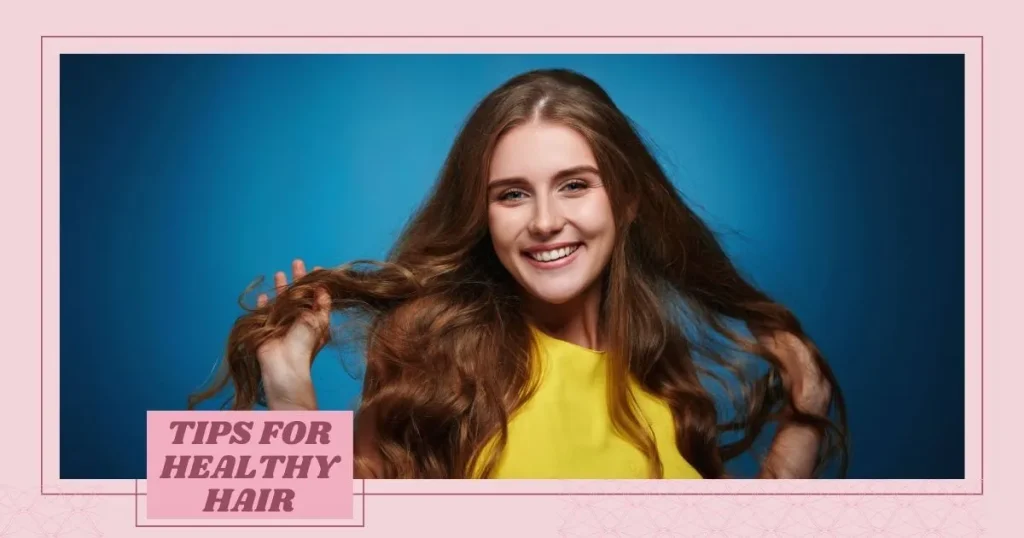Healthy hair is not just about looking good; it’s vital to our overall well-being and self-esteem. Shiny, strong, and luscious locks can boost our confidence and make us feel great. However, achieving and maintaining healthy hair requires more than a good shampoo. It involves a holistic approach that includes proper care, products, and a healthy lifestyle. `
This guide provides essential tips to maintain healthy hair from inside and outside. Looking for tips to maintain healthy and luscious hair? This post is perfect for you! Whether you’re into beauty or just interested in hair health, we’ve got you covered with all the information you need.
Table of Contents
The Importance of Hair Health
Hair is an aesthetic feature and a barometer for systemic health. Our hair’s health can affect our overall well-being. If our hair looks dull and brittle, it might be due to a lack of nutrients, while excessive hair loss could point to an underlying health problem.
Understanding the importance of hair health is crucial for promoting beauty and well-being. We must adjust our daily hair care routines and lifestyle choices to achieve this. By doing so, we can improve the overall health of our hair and enhance our appearance.
Understanding Hair Health
Factors Contributing to Hair Health
- Genetics: Your genetic makeup plays a significant role in determining the health, texture, and growth rate of your hair.
- Diet: Nutrient-rich foods provide the necessary vitamins and minerals that promote hair strength and growth.
- Lifestyle: Stress, sleep patterns, and overall health can impact the condition of your hair.
- Environmental Factors: Pollution, UV exposure, and weather conditions can affect hair health.
Tips for Healthy Hair
1. Regular Hair Washing
Ensuring that you wash your hair regularly is essential to maintain healthy hair. It forms the foundation of any sound hair care routine. While the ideal frequency might vary from person to person, the key is to find a balance that doesn’t strip your hair of natural oils or leave it too greasy.
Daily washing is necessary for some due to a greasy scalp or a highly active lifestyle; others can thrive with two to three washes a week. It often depends on your hair type, the weather, and even your workout routine. Those with dry or curly hair require less frequent washing to avoid further dryness. In contrast, individuals with fine hair may need more regular washing to prevent oil build-up.
Tips for Effective Hair Wash
Choose a Gentle Shampoo
Opt for sulfate-free shampoos, as they are less harsh on your scalp and strands. It is important to choose hair care products that use natural ingredients to clean hair without stripping away its natural oils.
Focus on Scalp Massage
While washing, pay special attention to massaging your scalp. This stimulates blood flow, promoting hair growth and a healthy scalp environment.
Rinse Thoroughly
Residual shampoo can leave a film on your hair, making it appear dull and lifeless. Be sure to rinse until the water runs clear.
2. Proper Hair Conditioning
Conditioning your hair is just as crucial as washing it. Conditioners help to restore moisture, add shine, and improve manageability.
Apply Conditioner to the Ends First
The tips of your hair are considered the oldest and most delicate part. Apply conditioner here first, then work your way up to the mid-lengths. This prevents the roots from becoming too oily.
Use a Wide-Tooth Comb in the Shower
When you have applied the conditioner to your hair, make sure to use a wide-tooth comb to remove tangles gently. This helps to spread the product evenly and also prevents hair from breaking.
Choose the Right Conditioner for Your Hair Type
Like shampoo, your conditioner should match your hair type. Conditioners are designed to cater to your hair’s specific needs, regardless of whether it is straight, curly, thick, or thin. Using the right conditioner makes your hair healthier and more manageable.
3. Scalp Massage Techniques
Scalp massages are more than just a relaxing treat—they’re a powerful way to enhance hair health. Massaging your scalp regularly can help increase blood flow in the area. Supplying your hair follicles with essential nutrients and oxygen can help support healthy hair growth.
Circular Motion
Use your fingertips to move in a circular motion all over your scalp. Apply gentle pressure and gradually work your way to the temples.
Kneading
Using both hands, grasp small sections of your scalp between your fingers and thumbs and knead them as you would bread dough. This method can release tension and enhance the scalp’s flexibility.
Acupressure Points
Research acupressure points related to hair health and see if you can incorporate them into your massage. The stimulation of these points can further support hair growth and scalp health.
4. Choosing the Right Hair Products
Hair product overload is a common issue, with many unaware of the effects their products can have on their hair. Making informed choices can significantly contribute to hair health.
Knowing your hair type is essential in picking the right products. Dry, oily, curly, straight, color-treated—each requires specific ingredients to thrive. Ingredients such as shea butter, argan oil, aloe vera, and coconut oil are well-known for their ability to moisturize and protect the skin. Seek out products that contain these, especially if your hair needs extra care.
Styling your hair using heat can cause significant damage to your hair. Protect your hair with a thermal styling spray or serum if you can’t do it without your blow-dryer or flat iron.
5.Avoiding Heat Damage
Hair straighteners, curling wands, and blow dryers are notorious for robbing hair of its natural moisture, eventually leading to frazzled strands. When it’s too hot, the water inside your hair can turn to steam and make your hair swell up and become weaker. Regular use can lead to brittle hair that breaks easily. Before reaching for that styling tool, shield your hair with a heat-protectant spray or serum. These products form a thin layer over the cuticle to minimize moisture loss and protect the hair from direct heat damage.
The ‘high heat’ setting on your styling appliances may speed up the process, but it also speeds up the damage. Use lower heat settings whenever possible, and try to air dry your hair naturally. If you can’t do without your styling tools, at least try to reduce their frequency of use. Air dry your hair when you can, and use styling tools only on special occasions.
6.Trimming Regularly
The idea of cutting your hair to make it grow is counterintuitive. Still, it’s a vital part of maintaining healthy hair. Split ends occur when the hair’s damaged cuticle peels back, exposing the inner cortex to damage. It’s important to trim your hair every 6-8 weeks to maintain healthy hair.
Trimming your hair every few weeks helps to prevent splits from moving up the hair shaft. Regular trims help keep your hair looking its best, boosting your confidence to try different styles without the barrier of unhealthy ends.
7.Balanced Diet and Hydration
What you eat greatly influences your hair health. A balanced diet rich in nutrients can do wonders for your tresses. Since your hair is made of protein, eating enough protein is important in your diet. Good protein sources are meat, fish, eggs, and dairy products. If you’re vegetarian or vegan, lentils, chickpeas, quinoa, and nuts are excellent sources.
It’s important to include omega-3 fatty acids in your diet to keep your scalp and hair hydrated. These fatty acids can be found in foods like flaxseeds, walnuts, chia seeds, and fatty fish such as salmon, mackerel, and sardines. These foods contain the oils that keep your scalp healthy and nourished.
Like the rest of your body, your hair needs water to maintain shape and health. Drink at least eight glasses of water a day to stay hydrated. Hair-healthy vitamins include biotin, vitamin E, and vitamin D. Minerals such as zinc and iron contribute to hair health. You can find them naturally in various foods or take a supplement if your diet doesn’t provide enough.
8.Protecting Hair from UV Rays
We’re often diligent about applying sunscreen to our skin. Still, we often forget about our hair, which can also suffer from sun damage. The simplest way to protect your hair is by wearing a hat when you’re in the sun for extended periods. Many hair care brands offer SPF-infused products, such as leave-in conditioners and serums, designed to protect hair from UV rays.
9.Minimizing Chemical Treatments
In today’s world, it’s not uncommon for individuals to seek chemical treatments to enhance or change the appearance of their hair. Quick transformations, from coloring to straightening treatments, are often tempting. However, it is important to remember the risks involved. However, these treatments come with a cost to the health of your hair. Here are a few ways to minimize the impact of chemicals on your hair:
Consider utilizing natural hair colorants like henna or indigo for a gentle dye that nourishes as it tints. Similarly, natural hair straightening methods can be as effective as chemicals without long-term damage. If you’re a frequent user of chemical treatments, consider taking a hiatus. Allowing your hair to recover will reduce the risk of over-processing and restore its natural shine.
When using chemical treatments, choose products free from harsh ingredients like sulfates and parabens. It’s best to be selective about the products you use. By being mindful of the treatments we subject our hair to, we can significantly increase its longevity and vibrancy.
10.Hair Masks and Treatments
Regularly applying hair masks and treatments is an excellent way to revitalize your locks and maintain their health. These nourishing rituals can address many hair woes and promote overall good condition.
There’s no one-size-fits-all approach to hair masks. When selecting hair care products, it’s important to choose ones that are designed for your specific needs. These can include hydration for dry hair, protein for strength, or oils for taming frizz. Make sure to choose the product that is best suited for your hair type and needs.
Incorporate a weekly hair treatment into your routine. This consistent care will ensure your hair always benefits from the extra nourishment required to be healthy. For those who prefer a natural or budget-friendly approach, consider DIY hair masks using ingredients you likely already have in your kitchen. Avocado, coconut oil, and honey are all excellent starting points for homemade hair treatments.
You can foster a more vibrant and resilient mane by being consistent with hair treatments and tailoring them to your hair’s unique needs.
11.Managing Stress for Healthier Hair
Stress often contributes to various health concerns, including hair loss and poor hair quality. Learning to manage stress can have a profound impact on the the health of your hair.
Take time to identify the aspects of your life that cause you the most stress. Whether it’s work, relationships, or finances, developing strategies to address these stressors is key. Incorporate regular exercise, meditation, or hobbies into your routine to help manage stress levels. These activities can be both preventive and restorative.
If stress significantly impacts your life and health, don’t hesitate to seek professional help. Therapists and counselors can help you manage stress effectively. Reducing stress can improve your overall well-being and even promote healthier hair growth.
12.Quality Sleep for Hair Regeneration
The importance of quality sleep for overall health is well-documented, and its impact on hair health is no exception. During sleep, the body undergoes various processes necessary for regeneration, including those that benefit the hair.
It’s important to maintain a consistent sleep routine. Try to go to bed and wake up at the same time every day. Getting quality sleep is important for your overall well-being. To achieve this, it is essential to regulate your body’s internal clock. By doing so, you can help your body’s natural processes work better and promote better rest. A good night’s sleep will make you feel more rested and energized.
For better sleep quality, try establishing a soothing bedtime routine. You can include reading, taking a warm bath, or doing gentle stretching exercises. Your sleep environment can also make a big difference. Make sure your bedroom is cool, dark, and quiet. You can also consider investing in a comfortable mattress and pillows. By prioritizing your hours in bed, you can support the natural cycles that lead to healthier, more resilient hair.
Final Thoughts – Tips for Healthy Hair
Healthy hair reflects our overall health and well-being. By implementing these tips into your regular hair care routine, you can enhance the beauty and vitality of your hair. Remember, patience is key when seeing the results of these changes. Practicing healthy hair care habits will eventually result in beautiful, lively hair. With time, you’ll notice a positive change in your hair and achieve the desired look.
Frequently Asked Questions
What foods promote healthy hair?
Eating foods high in vitamins and minerals, like fruits, vegetables, nuts, and fish, is important to keep your hair healthy. Additionally, remember to drink plenty of water.
Is it okay to use heat-styling tools?
Limiting heat styling tools and applying a heat protectant can help prevent damage. Try to give your hair breaks from styling occasionally.
How can I prevent split ends?
To prevent split ends, getting regular haircuts, using a wide-tooth comb to detangle, and avoiding using excessive heat or chemicals on your hair are important. Following these steps can keep your hair healthy and prevent damage.
Does stress affect hair health?
Yes, stress can impact your hair. Practice stress-relieving activities like exercise, meditation, or hobbies to promote overall well-being, including your hair health.
What type of shampoo and conditioner is best for my hair type?
Choose a shampoo and conditioner that suits your hair type (oily, dry, curly, straight) and addresses specific concerns like volume or hydration.
Can I air-dry my hair instead of using a blow dryer?
Absolutely! Air-drying is a gentler option. If you need a blow dryer, keep it in a low or cool setting and maintain some distance from your hair.
How does diet impact hair growth?
A balanced diet with enough protein, vitamins (especially A, E, and D), and minerals (like iron and zinc) supports healthy hair growth.
What role does hydration play in hair health?
Water is essential for good health, and it also impacts your hair’s health. Drinking enough water is important to maintain healthy hair and overall well-being. Make sure to keep your body and hair hydrated by drinking sufficient water.
Are there natural remedies for improving hair health?
Yes, using natural oils like coconut or olive oil as a hair mask or incorporating ingredients like aloe vera and egg masks can contribute to healthier hair.
- How to Use Aloe Vera for Acne: A Comprehensive Guide - June 1, 2024
- Jojoba Oil for Hair: How to Use for Maximum Benefits - May 19, 2024
- 8 Benefits of Jojoba Oil for Skin: The Ultimate Guide - May 18, 2024



